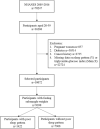Triglyceride glucose index and poor sleep patterns in non-diabetic adults: Evidence from NHANES 2005-2016
- PMID: 36793924
- PMCID: PMC9922746
- DOI: 10.3389/fnut.2023.1051667
Triglyceride glucose index and poor sleep patterns in non-diabetic adults: Evidence from NHANES 2005-2016
Abstract
Introduction: Sleep disorders are commonly encountered in modern populations. This cross-sectional study aimed to investigate the associations between triglyceride glucose (TyG) index and poor sleep patterns in non-diabetic adults.
Methods: Data of non-diabetic adults aged 20-70 years were extracted from the US National Health and Nutrition Examination Survey database 2005-2016. Pregnant women, individuals with diabetes and cancer history, and individuals lacking complete data on sleep patterns or parameters for calculating TyG index were excluded. Poor sleep pattern was defined as having two or more following conditions: (1) abnormal sleep duration, defined as less than 7 h or longer than 9 h; (2) self-reported trouble sleeping; and (3) physician-confirmed sleep disorders. Associations between poor sleep patterns, TyG index, and an additional index incorporating body mass index (BMI), TyGBMI, and other study variables were determined by univariable and multivariable logistic regression analysis.
Results: Among 9,390 included participants, 1,422 had poor sleep patterns and 7,968 did not. The individuals with poor sleep patterns had a higher mean TyG index, were older, had higher BMI, and had higher proportions of hypertension and history of CVD than those without poor sleep pattern (all p < 0.001). Multivariable analysis showed no significant association between poor sleep pattern and TyG index. However, among the components of poor sleep pattern, TyG index in the highest quartile (Q4) was significantly associated with trouble sleeping [adjusted OR (aOR): 1.46, 95%CI: 1.04-2.03) as compared with the lowest TyG quartile (Q1). In addition, TyG-BMI in Q4 was indepently associated with increased likelihood for poor sleep patterns (aOR: 2.18, 95%CI: 1.61-2.95), trouble sleeping (aOR: 1.76, 95%CI: 1.30-2.39), abnormal sleep duration (aOR: 1.41, 95%CI: 1.12-1.78), and sleep disorders (aOR: 3.11, 95%CI: 2.08-4.64) as compared to Q1.
Discussion: Among US adults without diabetes, elevated TyG index is correlated with self-reported trouble sleeping, independent of BMI. Future studies should build upon this preliminary work and examine these associations longitudinally and through treatment trials.
Keywords: National Health and Nutrition Examination Survey (NHANES); insulin resistance (IR); patterns; sleep; triglyceride-glucose index (TyG).
Copyright © 2023 Liu and Chien.
Conflict of interest statement
The authors declare that the research was conducted in the absence of any commercial or financial relationships that could be construed as a potential conflict of interest.
Figures
References
-
- Zhu B, Wang J, Chen K, Yan W, Wang A, Wang W, et al. A high triglyceride glucose index is more closely associated with hypertension than lipid or glycemic parameters in elderly individuals: a cross-sectional survey from the Reaction Study. Cardiovasc Diabetol. (2020) 19:112. 10.1186/s12933-020-01077-6 - DOI - PMC - PubMed
LinkOut - more resources
Full Text Sources


